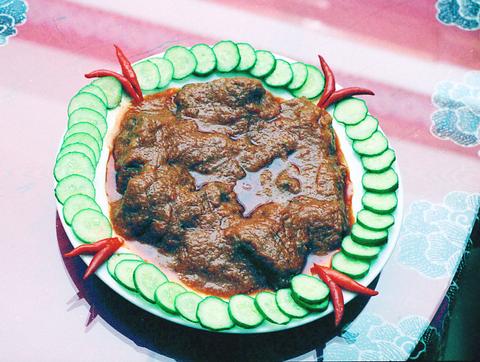Hidden among a jungle of restaurants on Fuhsing North Rd., Pondok Mutiara easily goes unnoticed, but it has long been a regular place for people who know about Indonesian food. It has been at its current location for over 12 years, and has been operating for 25.
The decor is simple, with the Indonesian flavor provided by the batik tablecloths and a few carvings on the wall. Most important is probably Mother Chang (
But the food can certainly compete with that offered by the fanciest restaurants. Tuck into the rendang sapi (

PHOTO: IAN BARTHOLOMEW, TAIPEI TIMES
"Indonesian food uses a lot of spices," said Clement Chang (張權), who manages the restaurant. "These spices are often very good for your health." But health takes a poor second place when tucking into the excellent food. Chili is one of the most commonly used spices, but for those who can't take it too hot, Chang emphasized that all dishes come at hot, medium or mild variations.
One dish that reveals the skill of Pontok's chefs is the pepesan udang (
A huge variety of Indonesian food is represented at Pontok and they are not shy about serving dishes such as ikan pecek bawal (
In addition, Pondok recognizes the Dutch influence in Indonesia with Risoles, also called Western spring rolls. "We use a wheat flour skin and the filling is chicken, butter and mustard," Chang said, adding that he had eaten almost exactly the same thing when visiting Holland.
Another dish that has become an independent sideline for the restaurant is its kueh lapis (
Pondok also offers a wide range of vegetarian dishes.

In the March 9 edition of the Taipei Times a piece by Ninon Godefroy ran with the headine “The quiet, gentle rhythm of Taiwan.” It started with the line “Taiwan is a small, humble place. There is no Eiffel Tower, no pyramids — no singular attraction that draws the world’s attention.” I laughed out loud at that. This was out of no disrespect for the author or the piece, which made some interesting analogies and good points about how both Din Tai Fung’s and Taiwan Semiconductor Manufacturing Co’s (TSMC, 台積電) meticulous attention to detail and quality are not quite up to

April 21 to April 27 Hsieh Er’s (謝娥) political fortunes were rising fast after she got out of jail and joined the Chinese Nationalist Party (KMT) in December 1945. Not only did she hold key positions in various committees, she was elected the only woman on the Taipei City Council and headed to Nanjing in 1946 as the sole Taiwanese female representative to the National Constituent Assembly. With the support of first lady Soong May-ling (宋美齡), she started the Taipei Women’s Association and Taiwan Provincial Women’s Association, where she

Chinese Nationalist Party (KMT) Chairman Eric Chu (朱立倫) hatched a bold plan to charge forward and seize the initiative when he held a protest in front of the Taipei City Prosecutors’ Office. Though risky, because illegal, its success would help tackle at least six problems facing both himself and the KMT. What he did not see coming was Taipei Mayor Chiang Wan-an (將萬安) tripping him up out of the gate. In spite of Chu being the most consequential and successful KMT chairman since the early 2010s — arguably saving the party from financial ruin and restoring its electoral viability —

It is one of the more remarkable facts of Taiwan history that it was never occupied or claimed by any of the numerous kingdoms of southern China — Han or otherwise — that lay just across the water from it. None of their brilliant ministers ever discovered that Taiwan was a “core interest” of the state whose annexation was “inevitable.” As Paul Kua notes in an excellent monograph laying out how the Portuguese gave Taiwan the name “Formosa,” the first Europeans to express an interest in occupying Taiwan were the Spanish. Tonio Andrade in his seminal work, How Taiwan Became Chinese,